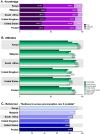Preconception health knowledge, attitudes and behavioural intentions among adults: a multi-country study
- PMID: 40336069
- PMCID: PMC12057062
- DOI: 10.1186/s12978-025-02015-z
Preconception health knowledge, attitudes and behavioural intentions among adults: a multi-country study
Abstract
Background: Preconception health-the health status of individuals prior to conception-is vital for positive pregnancy outcomes and long-term health. Despite its importance for maternal and infant well-being, it remains under-researched and often overlooked in global maternal and child healthcare.
Methods: We conducted a cross-sectional online survey with adults (18-55 years old) from Kenya, South Africa, Malaysia, the United States, and the United Kingdom (n = 5000), gathering data on preconception health knowledge, attitudes, behavioural intent, and respondents' preferences regarding factors important before pregnancy and preferred sources of health information. A generalised structural equation model (gSEM) was constructed a priori to assess the relationship between socioeconomic position and preconception health knowledge, and whether this relationship was mediated by preconception attitudes and behavioural intent.
Results: Preconception health knowledge, attitudes, and behavioural intent showed significant variation across the countries. Over half of the respondents reported having adequate preconception knowledge (50.3%), with the USA having the highest proportion of respondents with good knowledge (13.8%) and Malaysia having the highest proportion with poor knowledge (42.5%). In the pooled sample, physical health was considered the most important factor before pregnancy, followed by relationships and family. Clinic doctors were the most preferred source of information, followed by nurses and obstetricians/gynaecologists. The relationship between preconception knowledge and behavioural intent was fully mediated by a combination of preconception attitudes (71.7%).
Conclusion: Preconception health knowledge, attitudes, and behavioural intent differed across the five economically diverse countries. Pregnancy factors were prioritised differently across settings, likely reflecting disparities in culture, socioeconomic status, and healthcare access, with varying preferences for sources of preconception health information. These findings underscore the importance of designing tailored interventions that consider socioeconomic and cultural differences to enhance overall health outcomes.
Keywords: Attitudes; Behavioural intent; Factors important prior to pregnancy; Multicountry; Preconception health knowledge; Preferred sources of health information.
© 2025. The Author(s).
Conflict of interest statement
Declarations. Ethics approval and consent to participate: Ipsos panels are part of research institutions that adhere to industry standards and regulations, such as those set by the South African Market Research Association, the European Society for Opinion and Market Research, the Protection of Personal Information Act in South Africa, the Market Research Society, and the General Data Protection Regulation. Additionally, since Ipsos operates as a market research firm and panel surveys are opt-in (respondents voluntarily choose to participate after reviewing the data privacy policy and confidentiality procedures), Ipsos and its entities are not required to obtain ethical approval. However, for any study involving human participants, ethical approval is necessary. This study was conducted in accordance with the ethical principles of the Declaration of Helsinki, and ethics approval was granted by the Human Research Ethics Committee (Non-Medical) at the University of the Witwatersrand, South Africa (H21/06/36). All participants were thoroughly informed about the study’s objectives, and informed consent was obtained from each respondent. Consent for publication: All authors were responsible for revising the manuscript and approved the submitted version. Competing interests: The authors declare no competing interests.
Figures



References
-
- Shawe J, Steegers EAP, Verbiest S, Springerlink. Preconception health and care: a life course approach. cham: springer international publishing; 2020.
-
- Stephenson J, Heslehurst N, Hall J, Schoenaker DAJM, Hutchinson J, Cade JE, Poston L, Barrett G, Crozier SR, Barker M, Kumaran K, Yajnik CS, Baird J, Mishra GD. Before the beginning: nutrition and lifestyle in the preconception period and its importance for future health. Lancet. 2018;391(10132):1830–41. 10.1016/S0140-6736(18)30311-8. - DOI - PMC - PubMed
-
- Barker M, Dombrowski SU, Colbourn T, Fall CHD, Kriznik NM, Lawrence WT, Norris SA, Ngaiza G, Patel D, Skordis-Worrall J, Sniehotta FF, Steegers-Theunissen R, Vogel C, Woods-Townsend K, Stephenson J. Intervention strategies to improve nutrition and health behaviours before conception. Lancet. 2018;391(10132):1853–64. 10.1016/S0140-6736(18)30313-1. - DOI - PMC - PubMed
MeSH terms
LinkOut - more resources
Full Text Sources
Medical

